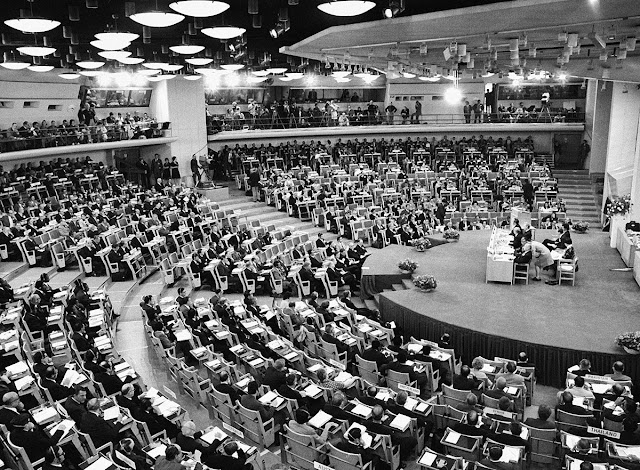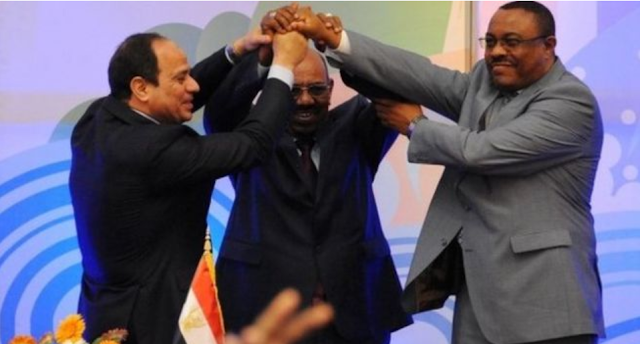Ethiopia: Better to Stay Suspicious On Egypt-Nile Nexus (Published in 2014, Still Relevant)
 |
| Blue Nile Fall |
Dynamics revolving the Nile River is always exciting. Especially with new leaders, new processes, and new plays - phrases like "new beginnings" dominate the Ethio-Egypt relations. It is one thing to be optimistic, but I think we need to take this narrative rather suspiciously.
As one newspaper puts it, the change in Egyptian policy towards the Nile River is the result of social, economic, diplomatic and psychological crisis in Egypt. Here, there are two points worth scrutiny; whether Egyptian policy towards the Nile River has changed and whether the overall turmoil in Egypt induces this policy change.
To dissect these points and their alleged relation, one has to check their truth value. Accordingly, there is an overall crisis, but it is difficult to prove the change in Egypt's policy on the Nile River, let alone establishing a causal relationship between the utter turmoil in Egypt and the change in Egypt's policy on the Nile. Therefore, an assertion that "there is a policy change in Egypt on the River Nile", and the causality of "overall crisis inducing this change" are problematic.
Policy analysts strongly argue that patterns, biographies and public addresses are typical manifestations of policy changes in the long-term. Notably, in a more intricate and significant issue such as the Nile River in Egypt, it is difficult, if not impossible, to establish concluding patterns from biographies and public statements made by public officials for several reasons.
The Nile River discourse in Egypt is not an introduction of the recent century; it is what made Egypt what it has been till today. Therefore, biographies rarely affect the structured and institutionalised Egyptian view of over the Nile River.
Partly, the fact that elitism in Egypt is known to perpetuate the status quo rather than calling a halt explains this. However, this does not mean that there are no elites who tried to change the Ethio-Egypt relation for the better.
My argument is that biographies are secondary factors as compared to a structure in the making and remaking of Egyptian institutional perception of the Nile River and Ethiopia. However, some naive commentators still prefer to make cabinet composition (elitism) as the primary tool to analyse the Egyptian perception on Nile and Ethiopia. But such an approach is wrong.
Comparatively, Boutros Boutros–Ghali followed a comprehensive and matured approach towards the Nile and its riparian countries. In his article entitled, "The Foreign Policy of Egypt", he quoted the all-time Afro-centric scholar, WEB DuBois, when he described the nature of the Egyptian republic as first-African, second-Mediterranean, third-Islamic and last-Arab.
Especially, after Boutros-Ghali became chief advisor on African Affairs to Anwar Sadat, his effort to influence the relations of Egypt with Ethiopia in particular, and Nile Basin countries in general positively. In his memoir entitled, "Egypt's Road to Jerusalem", he argued that basin-wide cooperation is the only alternative to guarantee the flow of the Nile.
He even boldly argued that Egypt's orientation must be focused more on the South than East. Besides, his idea of energy cooperation and his analysis of the Aswan Dam and the Lake Nasser reflect the possibility of a bridge rather than a barrier.
However, Boutros-Ghali utterly failed to alter President Sadat's Egypt policy on the Nile River. If not Boutros-Ghali, then, who?
Therefore, it is premature and naive to think there is a change in Egypt's policy towards the Nile River, and even erroneous to track policy changes using personalities in Egypt.
Other observers tried to put the supposed change in Egyptian orientation towards the Nile in terms of 'strategic shift'. Comparing this argument with the previous one, it is less ambitious but still erroneous and foolhardy.
Egyptian officials had been criticising Ethiopia as if it is trying to buy time to remain committed to the construction of the Great Ethiopian Renaissance Dam (GERD) so that the Dam could become a 'reality' on the ground. Such fear stems from the rationale that it is easier to halt the construction of the Dam in its earlier stage than later.
According to Egyptian officials, the sooner is, the better for Egypt, and the latter for Ethiopia. As the construction of the Dam continues, it becomes even more challenging to raise the issue of technical and engineering modifications; let alone stopping the development of the Dam. This seems a valid line of argument. However, it is literally impossible to think otherwise; I mean literally.
Cooperative behaviour in the Nile Basin has only two standards. These are active participation in the basin-wide institution, NBI; and being a party to the basin-wide agreement, the Cooperative Framework Agreement (CFA). Readiness for cooperation can easily be measured using these two factors.
It, therefore, instead is wise not to view Egypt's recent phenomenal positive outlook towards the Dam issue with the Sudan and Ethiopia, and Egypt's relation with the rest of the riparian states, as the sign of Egyptian strategy to delude. Also, it is wise to understand the fact that Egypt has a sovereign right to conduct its foreign policy as it sees fit.
Additionally, future tripartite discussions about implementing recommendations of the International Panel of Experts (IPoE) and future negotiations to establish the grounds for the Nile Commission are diplomatic spars that have no room for small scorings from delusions. Therefore, it is an exaggeration to argue that Egypt appears cooperative with ill-intentions.
Therefore, it is premature to conclude in any way about the Egyptian stance at least before the fourth tripartite meeting scheduled for late August, in Sudan. However, it is better to account that national interests persist way longer than leadership.
The fourth tripartite meeting to be held in Khartoum is the next diplomatic challenge for the Eastern Nile Basin. I believe this trilateral talk will not be different from the three consecutive tripartite discussions because "national position held by Egyptians persists way longer than leadership". This is me looking at matters as they are.
On the other hand, the fourth tripartite meeting might bring what the previous three consecutive meetings could not deliver, finding a negotiated way to implement the two recommendations proposed by International Panel of Experts (IPoE). In doing so, the Egyptian delegation has to stop nullifying what has been achieved so far – the IPoE Report and the Tripartite Forum. This is me looking at matters as they ought to be.




Comments
Post a Comment